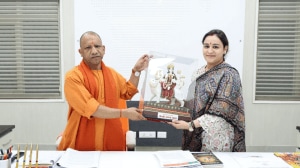Explained: Why Vatican has opened its archives of Holocaust-era Pope Pius XII before time
The Vatican normally waits 70 years after the death of a pope before making his archives available for study. However, in this case, the records have been made public eight years prior to this deadline.
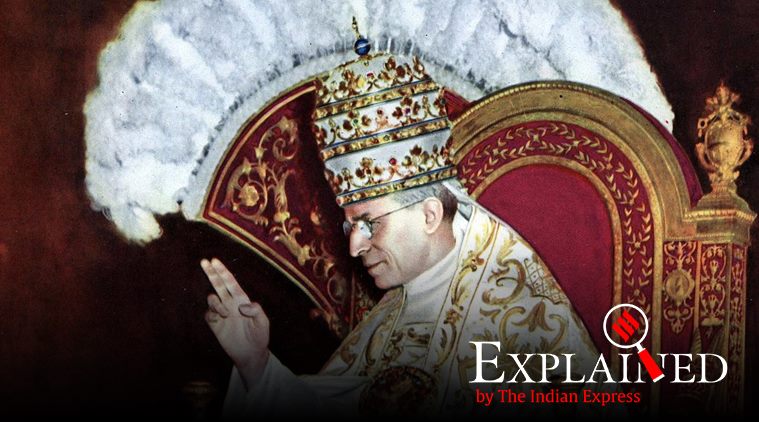 World War II pontiff Pope Pius XII. (Source: Wikimedia Commons)
World War II pontiff Pope Pius XII. (Source: Wikimedia Commons)
The Vatican Monday opened its archives on the controversial World War II pontiff Pope Pius XII, who has been accused of turning a blind eye to the Holocaust and never publicly condemning the persecution of Jews and others. The move, first announced by Pope Francis on March 4, 2019, was the result of years of pressure from various Jewish groups and historians around the world.
The Vatican normally waits 70 years after the death of a pope before making his archives available for study. However, in this case, the records have been made public eight years prior to this deadline.
Kept in vast storerooms in a two-storey underground vault below the Vatican’s public courtyard, the Vatican Apostolic Archive, (earlier known as the Vatican Secret Archive) is home to historical documents from as early as the 8th Century.
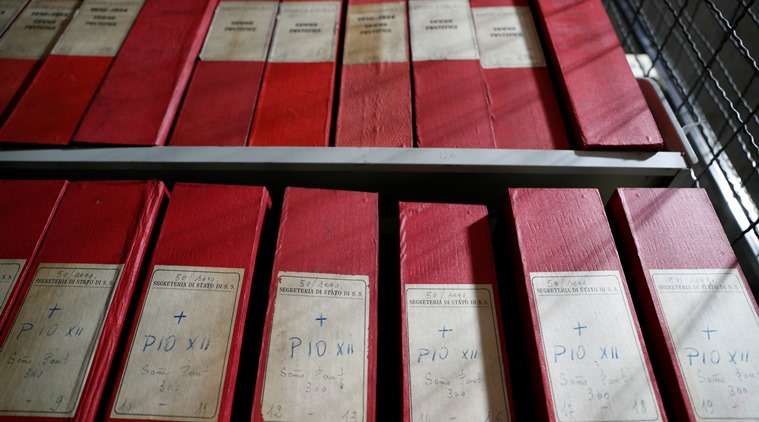 Folders containing documents on Pope Pius XII, who reigned from 1939-1958, are seen inside the Vatican archives ahead of the full opening of the secret archives to scholars on March 2, at the Vatican, February 27, 2020. (Reuters)
Folders containing documents on Pope Pius XII, who reigned from 1939-1958, are seen inside the Vatican archives ahead of the full opening of the secret archives to scholars on March 2, at the Vatican, February 27, 2020. (Reuters)
According to the official Vatican News website, the material now available includes about 120 series and archives from the Secretariat of State, Roman Congregations, and Curia offices, which make up about 20,000 archival units.
Who was Pope Pius XII
Pope Pius XII, born Eugenio Pacelli, was elected Pope on March 2, 1939, just six months before the Second World War II broke out across Europe.
Before his election to the papacy, Pacelli served as Cardinal Secretary of State for the Church, a position that oversees foreign policy. He was posted as the Holy See’s ambassador in Germany for 12 years and witnessed the rise of Hitler and the Third Reich.
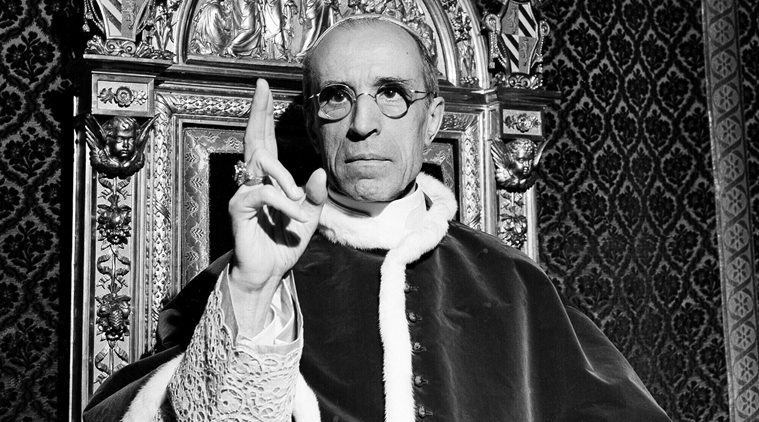 In this file photo dated Sept. 1945, Pope Pius XII, wearing the ring of St. Peter, raises his right hand in a papal blessing at the Vatican. (AP)
In this file photo dated Sept. 1945, Pope Pius XII, wearing the ring of St. Peter, raises his right hand in a papal blessing at the Vatican. (AP)
He died on October 9, 1958.
📢 Express Explained is now on Telegram. Click here to join our channel (@ieexplained) and stay updated with the latest
The controversy
Just years after his death, Pope Pius’ reputation began to deteriorate after a German play The Deputy accused him of “having failed to take action or speak out against the Holocaust” and sparked worldwide controversy.
In 1999, a book titled Hitler’s Pope: The Secret History of Pius XII accused Pope Pius of being “anti-Semitic” and alleged that the leader of the Roman Catholic Church “collaborated” with the Nazis.
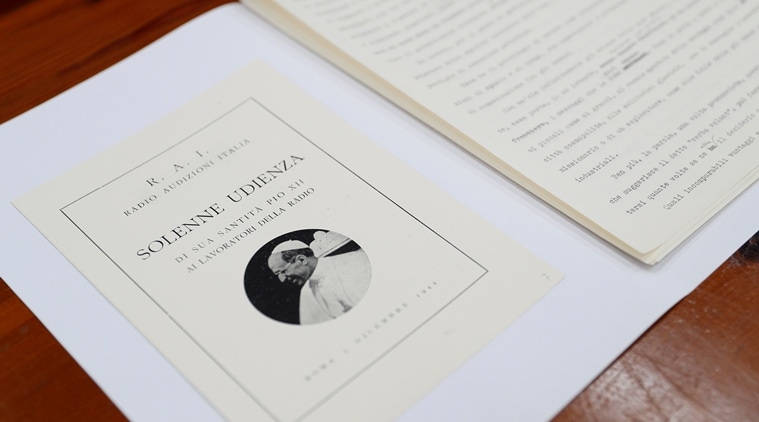 A document from archives on Pope Pius XII, who reigned from 1939-1958, containing the speech of Pius XII to RAI employees is displayed ahead of the full opening of the secret archives to scholars on March 2, at the Vatican, February 27,2020. (Reuters)
A document from archives on Pope Pius XII, who reigned from 1939-1958, containing the speech of Pius XII to RAI employees is displayed ahead of the full opening of the secret archives to scholars on March 2, at the Vatican, February 27,2020. (Reuters)
In his book, Cornwell writes: “I found evidence, moreover, that from an early stage in his career Pacelli betrayed an undeniable antipathy toward the Jews, and that his diplomacy in Germany in the 1930s had resulted in the betrayal of Catholic political associations that might have challenged Hitler’s regime and thwarted the Final Solution (Nazi plan for the genocide of Jews)”.
‘Church not afraid of history’
The Vatican, which officially stayed neutral during the war, maintains that Pius chose to work behind the scenes. The Church argues that Pius was concerned that public intervention would have worsened the situation for the Jews and Catholics during the wartime.
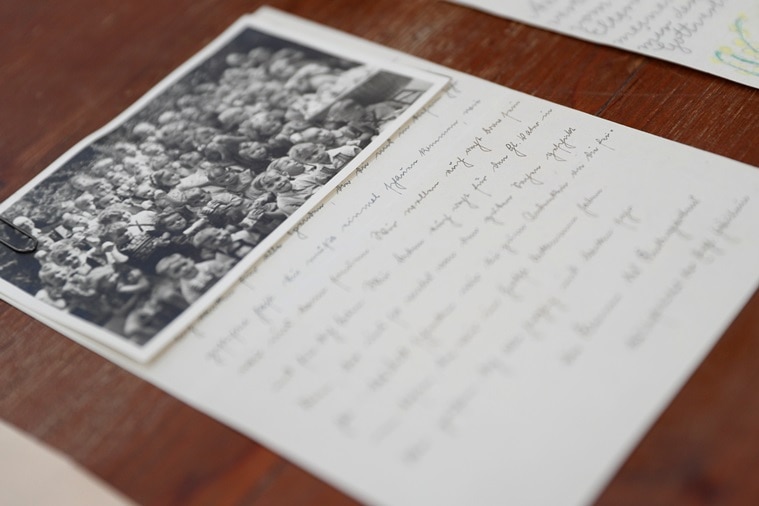 A letter from archives on Pope Pius XII, who reigned from 1939-1958, written by German children to thank Pius XII for the gifts they received for their first communion is displayed ahead of the full opening of the secret archives to scholars on March 2, at the Vatican, February 27,2020. (Reuters)
A letter from archives on Pope Pius XII, who reigned from 1939-1958, written by German children to thank Pius XII for the gifts they received for their first communion is displayed ahead of the full opening of the secret archives to scholars on March 2, at the Vatican, February 27,2020. (Reuters)
While making his decision to unveil the records, Pope Francis had said that the “Church is not afraid of history”, adding that he (Pius) led the Church during one of the “saddest and darkest periods of the 20th century”. He had also said that he was confident that “serious and objective historical research will allow the evaluation (of Pius) in the correct light,” including “appropriate criticism”.
Don’t miss from Explained | How to handle the coronavirus scare
Francis’s predecessor, Pope Benedict had also in 2009 declared that Pius XII had lived a life of “heroic” Christian virtue.
- 01
- 02
- 03
- 04
- 05













